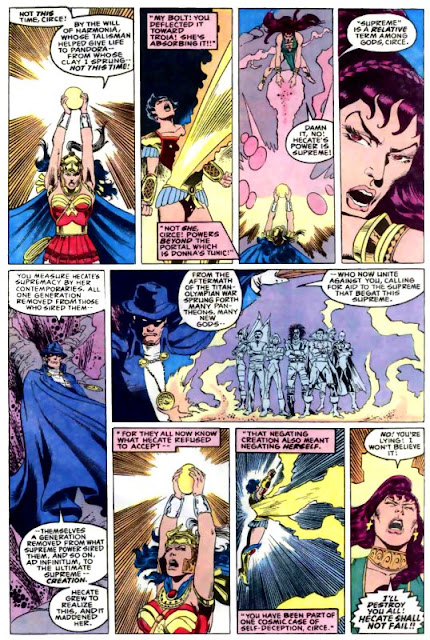These three characters all play roles that bear a striking resemblance to characters associated with the Christian Passion. This observation does not speak to what either of COIE's creators thought about religion. COIE is a secular comics-story and all the Judeo-Christian allusions are secular as well, just as were (Jewish) Marv Wolfman's uses of Christian mythology in the TOMB OF DRACULA series. But the fact that Wolfman and Perez invoked such complex associations at all speaks to the likelihood that they were attempting to endow their commercial endeavor with the significance of a great mythic tale, rather than just tossing together a crock-pot full of super-dudes and letting the chips fall where they might.
WAR OF THE GODS, though, has no "master thread" to unite all the chaos. The TPB referenced collects only the four issues of WAR and Perez's last five issues of WONDER WOMAN, and therefore it leaves out various other tie-ins to the main narrative. This means that the WAR TPB suffers from several storytelling lacunae, though at the same time a lot of the complementary stories, such as those of SUICIDE SQUAD, probably didn't really have much impact on the overall structure.
The main menace in CRISIS was the Anti-Monitor, who was gobbling up all the "alternate worlds" in the universe, and when he was stopped, the DC Universe ended up (however temporarily) with just one unitary universe. But since Perez wants to build up Wonder Woman's concluding storyline, the Amazon's old foe, Circe the Sorceress, unleashes an assortment of spells designed to destroy Gaea, the Goddess of Earth, for some vague reason. Circe not only framed the Amazons of Themiscyra for various crimes, she also foments a big purposeless martial conflict between the gods of various Earth-pantheons. Regardless of whether these deities are from ancient Africa or from the planet Thanagar, they're all pretty much thick-headed brawlers straight out of Jack Kirby, and not "godlike" in any way I recognize.
That said, there might still have been some potential in this setup, if the fight-scenes had been as vivid as what Perez gave fans in CRISIS. However, Perez only contributes various layouts to the project, and none of the people brought in to finish the pencils provided any really kick-ass scenes. Further, the most extended god-battle is the most problematic: a duel between the gods of Greece and those of Rome, which had all the charm of seeing superheroes fight their doubles. This idea that the Roman gods have some existence independent in the Universe allows Perez to revive "the Son of Vulcan," an obscure Charlton character whom DC purchased in the eighties-- a revival I feel confident no one was asking for. On a somewhat more satisfying level, the articulation of a Roman mythology allows Perez to provide a new origin for the diverse powers of Captain Marvel. This is also something no one was demanding (maybe Roy Thomas?), but if you have to have a retcon to explain a sloppy yet fun Golden Age formulation, you could do worse.
I seem to remember having a vague liking for the WAR story back in 1991, even though I wasn't reading most of the tie-in books, least of all Perez's WONDER WOMAN. I didn't remember that Perez is nowhere near as good at organizing fifty-something guest-star characters into one narrative as Wolfman and Perez were in CRISIS. One accepts that in multi-crossovers there will be numerous "walk-ons" who only appear to acknowledge their existence. Yet even the few characters who get more sizable dialogue-exchanges don't have actual character-arcs. Most if not all of the characters sound exactly the same and barely make reference to their individual lives. But even the five issues of WONDER WOMAN, in which Perez is dealing with a regular cast of characters, are marked by tedium and poor dramatic construction.
The closest Perez comes to valid myth is a sequence from the WONDER WOMAN title, in which the demigod Hercules visits Themiscyra. I can't remember if Perez's version of the hero had the same checkered history with the Amazons that appeared in the Marston canon, but if so, no one remarks on it. The island is assailed by earthquakes, and when Hercules ventures into caves beneath the island to learn what's going on, he learns that the island's being supported by that little old earth-supporter Atlas. After the two of them go back and forth on their contentious history, Atlas disappears and Hercules has to take over the role of supporting the giant's burden. However, Hercules' problem is apparently solved in one of the comics not collected here, which provides the most annoying lacuna in the narrative.
Oddly, The George Perez Website preserved a comment from an interview with the late artist , commenting on two of the projects Perez was working on at the same time, the other being INFINITY GAUNTLET, which Perez had to depart in order to finish WAR.
George also mentioned that he was itching to leave DC Comics (contract expires in 1990 but extended for WW's 50th): "I do not plan to ever sign another exclusive contract."
The story behind this is that he ended up working on War of the Gods (in celebration of Wonder Woman's then-50th Anniversary), but also working for Marvel Comics' Infinity Gauntlet AT THE SAME TIME. The result is that George had to drop IG to finish WotG.
It's strange how everybody loved Infinity Gauntlet (hot back issues and a popular movie)... while War of the Gods are typically quarter-bin comics.
I wouldn't necessarily validate the tastes of comics-fans across the board, but in this case, I think the fans were right. Whatever the flaws of GAUNTLET, it's a unified story with a beginning, middle and end. WAR OF THE GODS, with or without its crossovers, is just the aforementioned crock-pot of super-dudes-- and dudettes, of course.






No comments:
Post a Comment